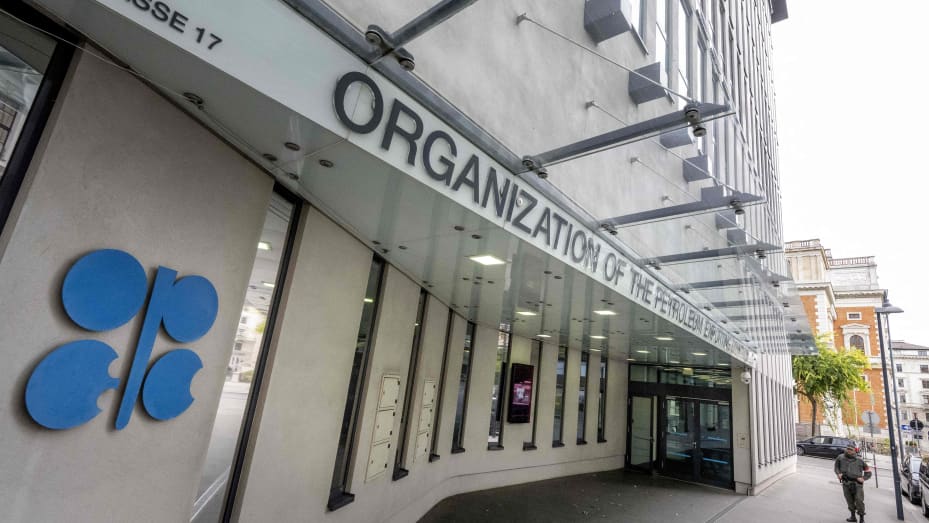



Here are the most important news items that investors need to start their trading day:
After two, rip-roaring rallies, U.S. stock markets settled back into negative territory Wednesday. The bulls showed a little fight toward the end of the day, but it wasn’t enough to keep the winning streak going. The general takeaway on Wall Street is that we’re still in an overall equities funk, particularly as the Federal Reserve pushes ahead with aggressive rate hikes to cool inflation. Earnings season begins in earnest next week, but until then, investors’ eyes are on the job market. Private businesses added 208,000 jobs last month, according to ADP, topping estimates. The government, meanwhile, will report monthly jobs data Friday. A hot job market will likely fuel the Fed’s rationale to hike rates further. Read live market updates here.

The oil-producing nations of OPEC+ on Wednesday agreed to the group’s largest supply cut since 2020, aiming to limit supplies as prices have fallen while concerns about a decline in worldwide demand have grown. The decision came at a moment fraught with political tension. The United States is in the midst of a tight election campaign that will decide the balance of power in Congress. The move drew anger from President Joe Biden’s administration and could result in some major blowback for key OPEC nation Saudi Arabia, which also counts itself as an ally of the U.S. The White House said a “disappointed” Biden would consult with Congress on ways to limit OPEC’s power in deciding energy prices. “Today’s dog whistle may be interpreted as a sign that the president will not necessarily stand in the way of a floor vote on the bill that would declare OPEC a cartel and subject the members to Sherman antitrust legislation,” said strategists at RBC Capital. Follow oil price movements here.

Elon Musk and Twitter haven’t reached a final agreement, but there have been several key behind-the-scenes developments in their negotiations. The judge who’s presiding over the legal fight between the two sides in Delaware Chancery Court said Wednesday that she was still preparing for the trial, set to begin Oct. 17, as neither side had asked for a delay. Musk was scheduled for a deposition in the case Thursday, but both sides agreed to postpone it as discussions continue, according to Reuters. The news service, citing sources, also said Apollo Global Management and Sixth Street Partners had ended discussions to provide as much as a combined $1 billion to help back the $44 billion deal.

A federal jury found Joe Sullivan, a former top security chief at Uber, guilty of covering up a cybersecurity breach in 2016 that affected the personal data of 57 million drivers and customers. “Sullivan affirmatively worked to hide the data breach from the Federal Trade Commission and took steps to prevent the hackers from being caught,” said Stephanie Hinds, U.S. attorney for the Northern District of California. Uber didn’t disclose the incident for a year. It is rare for cybersecurity executives to face prosecution in similar circumstances, so the case could mark a turning point. When Sullivan was indicted in 2020, prosecutors accused him of arranging to pay the criminals $100,000 in bitcoin while also having them sign nondisclosure agreements that falsely said they had not stolen any data during the hack. Uber had previously paid nearly $150 million to settle claims that it took too long to disclose the breach. The company reached a settlement to avoid criminal charges in July, agreeing to cooperate in Sullivan’s prosecution. He faces a potential five-year prison sentence.

Shocking news out of Thailand: A gunman killed at least 24 children and 11 adults in an attack that began at a childcare center in the northeastern part of the country. The suspect opened fire and killed multiple people as he drove away, before returning home to kill his wife and child, police said. He then took his own life, they added. Authorities identified the man as a former police officer. According to the Associated Press, gun deaths are rarer in Thailand than in nations like the United States and Brazil, but are higher than in places with strict gun laws, such as Singapore and Japan. The rate of firearms related deaths in 2019 was about 4 per 100,000, compared with about 11 per 100,000 in the U.S. and nearly 23 per 100,000 in Brazil,” the news service wrote.
– CNBC’s Carmen Reinicke, Sam Meredith, Natasha Turak and Holly Ellyatt contributed to this report.
